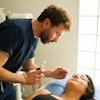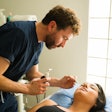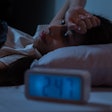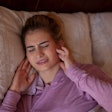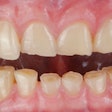
Musical performance, including playing a keyboard and upper string instruments, may be an occupational risk factor for temporomandibular joint disorders (TMDs). The study was published on September 30 in the Journal of Oral Rehabilitation.
Early-stage identification and treatment of TMD pain may prevent it from negatively affecting musicians' performance, as well as potential long-term complications, they wrote.
"An improved understanding of the causes, the implementation of preventive measures, professional guidance and a biopsychosocial healthcare perspective may decrease this occupational risk while maintaining the general health benefits of music," wrote the authors, led by Dr. Martin Shimmel of the University of Bern in Switzerland.
More recently, the relationship between playing instruments and the development of TMD has gained more attention within the medical and musical communities. Therefore, understanding the occurrence and risk factors of TMD will help better identify and diagnose symptoms and complications, according to the study.
To explore the relationship, 492 classical, jazz, and folk musicians completed a TMD-pain online survey. Of the participants, 96 (19.5%) reported pain. Those who reported pain were significantly younger, had less work experience, had fewer performances/year, and were predominantly women.
Although there was no statistical significance in the overall test (p = 0.13), musicians who played keyboard instruments (odds ratio [OR] = 2.99 [0.58, 30.12]), upper string instruments (OR = 2.31 [0.43, 23.63]), and sang (OR = 2.14 [0.44, 20.75]) reported more TMD pain than those who played lower strings (OR = 1.00), the authors wrote.
The study had limitations. The use of an online form to gather data made it impossible to follow up on participants after they graduated and gained more experience, the authors wrote.
Since TMD pain can cause physical discomfort, negatively affect performance, and lead to decreased endurance, a multifaceted approach from orofacial pain specialists, including dentists, and physical therapists, should be used to raise awareness and identify treatment options, they wrote.
"Playing keyboard instruments (other than organ) or upper strings instruments were frequently associated with painful TMD screening," Shimmel and colleagues wrote.

